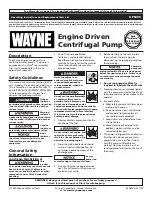
05
Operation
(14) This pump is not designed to be explosion-proof. When using the pump, ensure that there
are no inflammable materials such as solvents, or explosive gases, in the vicinity. Use under
such conditions may result in injury or fire.
(15) Inserting fingers or objects into the motor inlet may result in electric shock, injury, or fire.
(16) Operating the pump with the discharge outlet blocked, or with a device which prevents
passage of gas to the discharge outlet, may result in rupture of the pump. The internal
pressure of the pump rises and the pump body may rupture and the motor become
overloaded.
This pump is not designed to be pressure-resistant. The internal pressure of the pump is
limited to 0.03 MPa (gauge pressure).
Maintenance and Repair
(17) The pump should be dismantled or repaired only by a repair technician trained by the
manufacturer.
(18) To prevent ingestion of microscopic particles resulting from wear of components, use a dust
mask and gloves during repair work.
Installation
(1) The fine clearances used in this pump require that the following conditions be satisfied during
storage, installation, and operation.
1.
Ambient temperature of 0~40°C and maximum relative humidity of 85% during operation.
2.
Other conditions for storage and operation.
a) Level floor of sufficient strength.
b) No condensation
c) Dust-free environment
d) Well ventilated
e) Environment free of corrosive or explosive gas.
f)
Not subject to direct sunlight.
g) No danger of fire.
h) Maximum ambient temperature of 40°C during assembly of pump.
(2) To prevent back injury, always use both hands to lift pumps.
(3) Microscopic particles resulting from wear of components are discharged from the outlet and
contaminate the room. If necessary, connect a pipe from the discharge outlet to the outside of
the building.
Operation
(4) Do not use in applications involving organ transplants, or contact with body fluids or living
tissue.
(5) Touching rotating components (eg motor, main shaft, axial joints, cooling fan) while the pump is
in operation may result in injury.
(6) The overload protector operates when the pump becomes excessively hot. Touching it in this
condition may result in burns.
(7) Touching the motor while the pump is in operation or while it is still hot immediately after having
been switched off may result in burns.
(8) Do not insert fingers or objects into, or peer into, the inlet or outlet during operation.
!
Warning
!
Caution









































